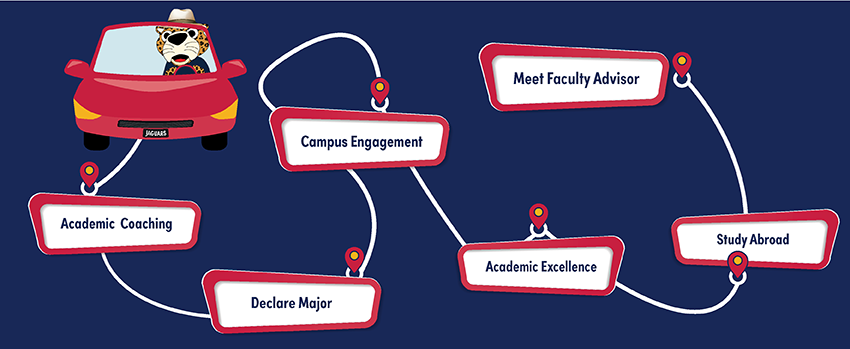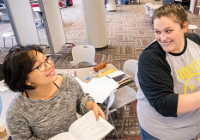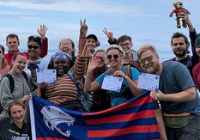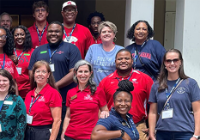Second Year Advising
Your Second Year Matters!
Your second year at South is a time for career exploration and decision making.
Use this year to turn inward and really explore how you fit into college life and
the world at large.
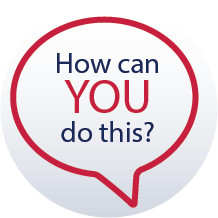

GET ENGAGED!

STEER YOUR DIRECTION!

FIND YOUR FOCUS!

LEAD!

KNOW YOU BELONG!

INTERACT WITH YOUR FACULTY!
THIS WILL FURTHER YOUR MOTIVATION, ACADEMIC SUCCESS, SELF-AUTHORSHIP AND THRIVING AT SOUTH!
"Learn more, lead more, and be more!"
There are many goals and expectations you have as a Second Year Students. You can find for more information on what is expected of you, your advisor, and for your Second Year in the Second Year Advising Syllabus.
Second Year Advising Syllabus
As a Second Year Student you will need to demonstrate you know
- Degree requirements.
- When to take courses based on your understanding of prerequisites and course sequences.
- How to locate career and professional development opportunities available to you, as well as on-campus support for the exploration of career paths.
- Academic policies and procedures.
- Campus resources and support systems that promote academic success.
- How to direct your actions to achieve your goals.
- How to connect campus involvement to future goals through leadership and mentorship programs.
- The importance of resources and leadership opportunities within your major.
- The impact of finding your place within the University’s community.
Expectations:
- Schedule and attend an advising appointment before your registration date to ensure on time semester registration and degree progression.
- Track your progress using Degree Works, and seek advice from your advisor to stay on track towards a four-year graduation plan.
- Become an active participant in the advising appointment.
- Be prepared to discuss goals, academics, and career plans.
- Complete 30-36 credit hours each academic year (including summer if necessary) to stay on track to graduate in four-years.
- Prepare for each advising appointment with questions and/or materials to discuss. Come to the meeting with an idea of courses you would like to take for the following semester.
- Ask questions if you do not understand an issue or have concerns.
- Understand degree requirements for your declared major.
Be aware of drop/add deadlines and university requirements and policies. - Be responsible for your academic decisions.
- Maintain good academic standing.
- Follow-up on referrals and recommendations and talk to your assigned advisor about the outcome of referrals.
- Write emails to faculty and staff that include your first and last name including your Jag Number.
- Maintain professionalism in your JagMail correspondence.
- Silence your cell phone during advising appointments.
- Identify your faculty advisor and the steps on how to meet with them.
- Join a student organization that has a direct relationship to your major or academic department.
- Focus your thoughts, emotions, and actions to align with your morals and beliefs.
- Take part in Study Abroad, internships, seminars, and other opportunities that help you grow in your learning.
To be Prepared for your meeting you will need the following:
- Read your JagMail every day
- Be aware of your class grades in Canvas
- Check your degree audit in Degree Works through PAWS regularly
- Come with a list of questions to ask your advisor
- Have an idea of which courses you would like to take for the following semester
Smart Goals
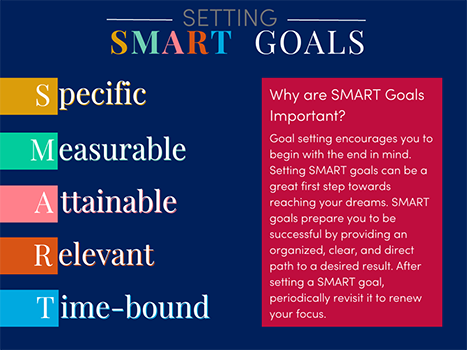
Thought Model
The thought model uses data, thoughts, feelings, and actions to categorize every aspect of life, in order to identify and change unintentional patterns. The basic premise of the model is that your thoughts produce your feelings, your feelings fuel your actions, and your actions create your results.
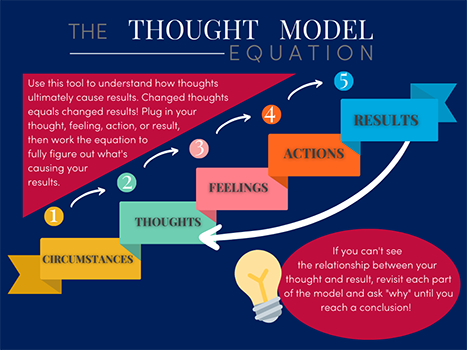
Action Plans
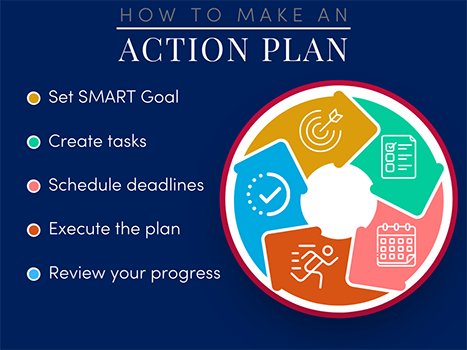
Academic Coaching is a one-on-one process that helps you reflect on your academic journey, recognize potential barriers to your success and adjust your approach to achieve your dream.
What does coaching look like in an appointment?
- Coaches provide individual semester-long support, assess the student's strengths and needs, and devise a personalized plan of action.
- Thought Model Work with the Student, Setting SMART Goals and Healthy Boundaries, Parallel Planning, and Major Exploration
All of our Advisors are working towards being certified Leader Led Coaches. Our coaches are certified by the best! Tarah Keech is a master life coach and holds an MA in clinical psychology. In addition to her work with AATS advisors at South, she's also been a consultant in the Fortunes for 10+ years.
What is coaching and how does it help students?
"Coaching is a tool you can utilize when you are having difficulty sorting out your thoughts and feelings, whether it be personal or academic. Having this tool available to you can help with figuring out career and academic goals, if you are struggling in courses and aren’t sure why, and aid in creating confidence in yourself." -Carson Wood, Academic Advisor II & Leader Led Coach
What does being a Leader Led Coach Mean to you?
"To me, being a leader led coach means being trained in another approach to help my students. It means that I am not only bettering myself but I also have the skillset to help my students work through challenging situations and grow from them." -Dallas Schmidt, AATS Coordinator & Leader Led Coach
What does a coaching meeting look like?
" I like to focus on the fact that coaching is not cheerleading. Within coaching meetings, you are working with students using thought-provoking and creative methods to allow for deeper conversations. This then allows you to provide inspiration and guidance through any perceived barriers along their academic journey. " - Jayla McAdory, Senior Advisor & Leader Led Coach
Resources:
- Center for Academic Excellence:
- The CAE offers writing consultations to help with essay assignments and other writing projects for any class in any discipline. We also provide subject-area tutoring for courses in math, sciences, and more. Tutoring sessions take place in-person and online.
- Academic Status
- General Requirements of Bachelor Degrees, a student must earn a minimum cumulative USA grade point average of 2.0 to graduate.
"The Office of International Education and Study Abroad incorporates global perspectives into educational endeavors at the University of South Alabama. Students interested in spending time abroad and receiving credit that will count toward their degree at South can contact the Study Abroad Office. We have over 800 programs in 60 different countries. It doesn't matter what area of study you are majoring in, YOU CAN STUDY ABROAD! Students can study abroad for as short as two weeks, two months, a semester, or even an academic year! Students can also apply for scholarships and grants to help pay for their program. Interested in learning more? Click here to visit our website or meet with a study abroad advisor!" - Jan-Dominique Santos, Education Abroad Advisor
“Jaguar Productions is the official Student Organizations Board for the University of South Alabama. Striving to provide the ultimate campus experience, Jaguar Productions encourages student involvement and community building through entertaining, educational, and diverse events. From music events, comedy shows, movies, and campus wide parties, JP has a variety of events for you to meet new people, get connected to campus, and have fun! All our events are student planned and student-led. We have leadership positions available for you to be involved with the event planning process. Check out our website and follow us @JPSouthAL on Instagram, Facebook, TikTok, and Twitter. “ -James Contratto, Interim Student Center Director for Facilities, Associate Director for Student Organizations- University Programs
What is the Transformational Leadership Program (TLP)?
The Transformational Leadership Program was created to supplement second year students' personal and professional development. It is based on career competencies championed by the National Association of Colleges & Employers (NACE) that employers expressed valuing in potential employees. Competencies are assigned to modules. Each module contains short and easy-to-read objectives, content, activities, and reflections that align with the common practices related to each competency. The materials in the TLP are NOT for credit, grade, or points. Please disregard any mention of points awarded in the TLP. This program is solely for students' personal and professional development.
"Invitations for the Transformational Leadership Program went out in August, and the program will conclude in April. Upon completion of the TLP, selected students will attend the SYE Career Trek. These students will participate in a FULLY-FUNDED trip to network with industry leaders and interview for experiential opportunities such as internships, job shadowing, and/or co-ops. Each of the monthly modules helps ensure that second year students are properly-prepared to talk about themselves with employers and connect those experiences to valued competencies. Have you accepted your invitation to the Transformational Leadership Program??? Check your JagMail for your invitation. If you do not see it, or have questions, please email sye@southalabama.edu. " -Donnie Lindsey, Second Year Experience Coordinator, Student Academic Success
“The USA Office of Community Engagement partners with dozens of community organizations from across the region to provide you with opportunities for volunteerism and service learning. As a member of the USA community, you are already part of South Serves, our online volunteer and service management system. To get started volunteering, all you have to do is complete your profile in South Serves. Once you do, you will find hundreds of opportunities for community engagement. Every time you serve, you will be building your volunteer résumé, which will show advisors and future employers your commitment to making a difference. Not only will you be helping your community, but you can also use your service hours to meet requirements for scholarships, student organizations, and courses. Please contact us at communityengagement@southalabama.edu or 251-460-6116 with any questions.” -Laurie Childers
Engineering, Biomedical Sciences, Interdisciplinary Studies and Biology all have milestones for students to meet to mark their progression to their majors.
Major Milestones are guidelines help students stay on track for timely graduation. In order to remain on track, students must complete the Milestone requirements for each term.
To Find Your Primary Advisor in Navigate South:
- Log into Navigate South.
- On the Student home page, click the Send a Message tab.
- Your primary academic advisor will be listed as the first name with the designated Advisor, Relationship.
- If you would like to send your advisor an email, you can click on the open box next to their name. Then click Actions. Then click Send Message.
- An email message window will pop up.
- When you complete your message and the subject line, scroll down and click the Send Message button.
- The message will include your last and first names as well as your JagMail address in the header. As a general rule, you should also include your Jag Number either in the body of the email or at the end of the email. This will ensure you are identified correctly and provided with the information specific and relevant to you.
Roadmap for Second Year Students!
